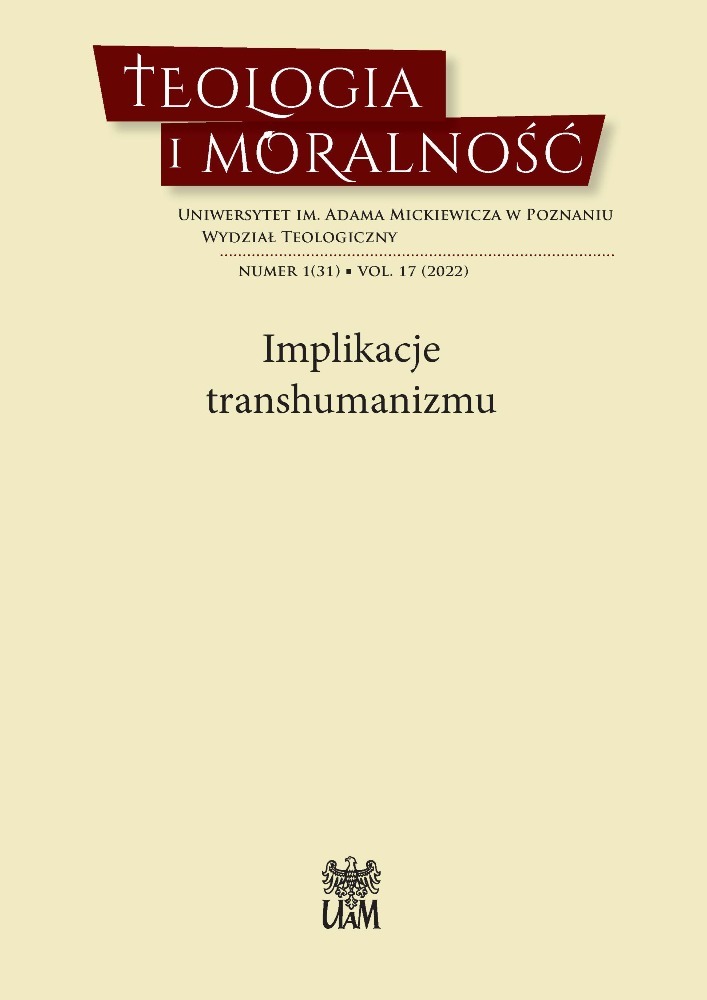Abstrakt
Biorąc pod uwagę, że transhumanistyczna wizja świata jest często przedstawiana jako pożądana dla ludzi i optymistycznie utopijna, celem artykułu jest zbadanie jednej z takich wizji, wyobrażonej przez Scotta Westerfelda w duologii Succession, aby sprawdzić, czy taki utopijny model nie zagraża przetrwaniu ludzkości. Unikając zwykłych, stricte dystopijnych i alarmistycznych scenariuszy, postmortalny i ekstropijny świat Westerfelda jest pełen wyzwań dla transhumanistycznych idei i pobudza do refleksji nad rzeczywistymi podstawami, na których miałaby się opierać przyszła komunikacja i współpraca, oraz nad granicami ulepszeń, których nie należy przekraczać, by uniknąć dehumanizacji.
Bibliografia
Asla, Mariano. 2018. “El Transhumanismo (TH) como ideología: ambigüedades y dificultades de la fe en el progreso.” Scio: Revista de Filosofía, 15: 63-96.
Asla, Mariano. 2020. “Transhumanismo.” In Diccionario Interdisciplinar Austral. http://dia.austral.edu.ar/Transhumanismo.
Bostrom, Nick. 2013. “Why I Want to Be a Posthuman When I Grow Up.” In The Transhumanist Reader, edited by Max More, and Natasha Vita-More, 28-53. Chichester: Wiley-Blackwell.
Bugajska, Anna. 2019. “Will Postmortal Catholics Have «The Right to Die»? The Transhumanist and Catholic Perspectives on Death and Immortality.” Forum Philosophicum 24, no. 2: 397-433. https://doi.org/10.35765/forphil.2019.2402.17.
Bugajska, Anna, and Lucas E. Misseri. 2020. “Sobre la posibilidad de una ética posthumana: propuesta de un enfoque normativo combinado.” Isegoría: Revista de Filosofía Moral y Política 63: 425-449. https://doi.org/10.3989/isegoria.2020.063.08.
Dvorsky, George. 2008. “All Together Now: Developmental and ethical considerations for biologically uplifting nonhuman animals.” Journal of Evolution and Technology 18, no. 1: 129-142.
Hauskeller, Michael. 2016. Mythologies of Transhumanism. London: Palgrave Macmillan.
Hughes, James. 2004. Citizen Cyborg: Why Democratic Societies Must Respond to the Redesigned Human of the Future. New York: Basic Books.
Immortality Institute. 2004. The Scientific Conquest of Death: Essays on Infi nite Lifespans. Buenos Aires: LibrosEnRed.
Kurzweil, Ray. 2006. Singularity Is Near. London: Duckworth Overlook.
Kymlicka, Will. 2011. Zoopolis: A Political Theory of Animal Rights. Oxford: Oxford University Press.
Latour, Bruno. 2014. Anthropology at the Time of Anthropocene - a personal view of what is to be studied. http://sector2337.com/wp-content/uploads/2015/06/Latour_Anthropocene.pdf.
More, Max. 2013. “The Philosophy of Transhumanism.” In The Transhumanist Reader, edited by Max More, and Natasha Vita-More, 3-17. Chichester: Wiley-Blackwell.
More, Max, and Natasha Vita-More eds. 2013. The Transhumanist Reader. Classical and Contemporary Essays on the Science, Technology, and Philosophy of the Human Future. Chichester: Wiley-Blackwell.
Roden, David. 2015. Posthuman Life: Philosophy at the Edge of Human. Oxon, New York: Routledge.
Westerfeld, Scott. 2003b. The Killing of Worlds. New York: Tor.
Westerfeld, Scott. 2003a. The Risen Empire. New York: Tor.
Licencja
Prawa autorskie (c) 2022 Anna Bugajska

Utwór dostępny jest na licencji Creative Commons Uznanie autorstwa – Bez utworów zależnych 4.0 Międzynarodowe.

